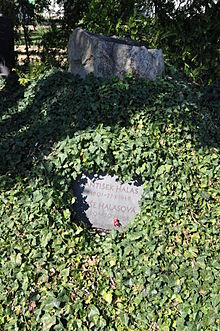František Halas
František Halas (born October 3, 1901 in Brno , Austria-Hungary , † October 27, 1949 in Prague ) was a Czech poet.
Life

His youth was firmly connected with his hometown, the Moravian capital Brno. His father was one of the leading labor functionaries and occasional writer. In the years 1916-1919 he completed an apprenticeship as a bookseller. He organized the communist youth and wrote for the daily Rovnost (equality). Together with Bedřich Václavek he founded a branch of the Prague Devětsil , took part in the manifesto of proletarian art by Jiří Wolker, and his poetic works were strongly influenced by the Karel Teige program.
On the other hand, he was enthusiastic about the expressionist poetry of Georg Trakl and the publications of the Christian publishing house Gutes Werk (Dobré dílo) by Josef Florian . He worked for Orbis publishing since the spring of 1926 and was friends with Jaroslav Seifert , Vítězslav Nezval , Vladimír Holan and the Catholic poet Jan Zahradníček , to whom he dedicated his collection The Face (Tvář, 1931).
From 1936 to 1942 he edited an edition of new authors in the Václav Petr publishing house . He also took part in the writers' resistance struggle and had to go into hiding towards the end of the war. After the war he became politically active and chaired the Syndicate of Czechoslovak Writers and Member of the Provisional Parliament. He worked in the Ministry of Information. At the same time, he and his father were opponents of the KSČ , which his fellow leftists never forgave him. After the communist seizure of power in 1948, he refused to join the pro-state association of Czechoslovak writers.
plant
František Halas is one of the most important Czech poets of the 20th century. His poetic works, he was one of the representatives of poetism , deal with the mysteries and meaning of human existence. They are shaped by deep skepticism and disillusionment, combined with the search for moral order.
His first book squid (cuttlefish, 1927) still corresponds to the poetic spirit of sensuality and imagination, but he begins by finding the moral order. It was widely recognized by FX Šalda. Letting go of the avant-garde canon is even more evident in his collection The Rooster Sheds Darkness (Kohout plaší smrt, 1930), in which the first motifs about doom, suffering, ruin, putrefaction and, above all, death come to light. However, they do not mark the end of a life, but also the beginning of a new one. His next work, The Face (Tvář, 1931), is much more melodic than the two previous books. The litany poem Old Women (Staré ženy, 1935) sparked passionate discussion among the left, who were his followers. In the poem, strength is combined with monumental tragedy.
In the Sperrangelweit open collection (Dokořán, 1936) he deals with the difficult political situation in Germany (takeover by the National Socialists ) and calls for a fight on the barricades . The Torso of Hope collection (Torzo naděje, 1938) contains poems that were created under the influence of the events in Prague in 1938 (mobilization, pre-war fear) and are probably among the most important texts. In 1940 a prosaic poem I return there (Já se tam vrátím) was published, in which he discovered his landscape (he lived in Kunštát since 1938 ) and the cycle of poems Our Lady Božena Němcová (Naše paní Božena Němcová), which is one of the works referring to the foundations of Bohemian culture. This also applies to the collection attunement (Ladění, 1942) with not only reflective but also political poetry . His last collection And Was (A co) he did not finish. When it was published in 1957, it attracted considerable attention because it contains poems that Halas only occasionally or not at all published during his post-war political functionary. Thematically, they show his deep skepticism towards the political developments in Czechoslovakia after 1948. In their poetic depth and in the radicality of the expression they are among the high points of modern Czech poetry.
His children's books were illustrated by the illustrator Ota Janeček .
Published in German
- The old women . Translation by Paul Eisner . Prague: Ms. Borový, 1936
- The political legacy of the poet Frantisek Halas , Rudl (1952)
- Children's paradise , poems for the little ones, translated by Erich Bertleff, illustrated by Ota Janeček , Dausien, Hanau 1960, DNB 451777123 .
- Poetry , translated by Peter Demetz , Suhrkamp, Frankfurt am Main 1965.
- The rooster scares away the darkness (Czech: Kohout plaší smrt ), translated by Karl-Heinz Jähn , Verlag Volk und Welt (1970)
- And the poet? (Czech: A co básník ), translated by Manfred Peter Hein , Zwiebelzwerg Verlag (1979)
- The old women , translated by Peter Demetz , Peter Ludewig, Berlin 1999, DNB 960523413 .
- J. Capek. A poem, three memorial texts and a letter from Halas about Josef Čapek translated by Peter Ludewig, Karl-Heinz Jähn and Ludvík Kundera . Ludewig, Munich 2001, ISBN 3-980585-19-0 .
- I kill the shadow that croaks , selected by Antonín Brousek , translated by ֲֲֲֲֲֲ Manfred Peter Hein , with an essay by Ludvík Kundera, Liebe , Weilerswist 2011, ISBN 978-3-941037-77-9 .
See also
Web links
- Literature by and about František Halas in the catalog of the German National Library
- slovnikceskeliteratury.cz
Individual evidence
- ↑ Antonín Brousek: Podivuhodní kouzelníci: čítanka českého stalinismu v řeči vázané z let 1945-55. Surrey 1987. ISBN 0-946352-39-9 , pp. 240f.
| personal data | |
|---|---|
| SURNAME | Halas, František |
| BRIEF DESCRIPTION | Czech poet |
| DATE OF BIRTH | October 3, 1901 |
| PLACE OF BIRTH | Brno |
| DATE OF DEATH | October 27, 1949 |
| Place of death | Prague |
